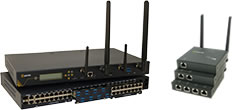
Growing hospitals need to expand their networks to match
By Donna DonnowitzSeptember 17, 2015
2015 has been a good year for the health care industry. With the number of of Americans without insurance approaching an all time low, according to Becker's Hospital Review, it's no surprise that this year's job growth in the health care field is outpacing hiring rates in 2014 over the same period. Hiring surges and fewer uninsured patients translates to a rapidly increasing population of patients needing treatment, and hospitals are turning to technology to keep up with the logistics of scale. Unfortunately, simply investing in servers and screens isn't enough to graduate a basic network setup to full fledged data-center status.
"Selection of network gear helps IT teams keep pace with data-driven health care."
IT teams will need dependable, secure network gear to improve the performance of the hospital data center and expand the ways that technologies can help health professionals provide better care to their patients. Availability is absolutely critical, after all. If doctors and patients are left waiting due to network errors, hospitals may devolve into delivering substandard levels of care. Likewise, the reputation of the entire organization is put at risk. Careful selection of network gear and tactical infrastructure expansions will help hospital IT teams keep pace with the growing demands of an increasingly data-driven health care environment.
Reliable data management depends on infrastructure compatibility
One of the most common errors a hospital IT team can make when looking to expand its functionality by adding new infrastructure is making purchase without considering connectivity. This principle also applies to software investments - even the most advanced health care data management solution in the world offers little help to patients if hospital IT can't connect the server hosting their new software to the pieces of equipment collecting said data.
This problem speaks to the importance of network gear like high-performance terminal servers. With a simple, dependable means of connecting devices with serial ports over Ethernet, hospital IT can resolve connectivity issues with equipment as diverse as blood sample analyzers and bar code readers. The same equipment can be utilized to network card readers and other forms of industrial equipment, expanding the hospital's ability to upgrade and automate systems across the facility.
Ethernet extenders help deliver Wi-Fi to new spaces
Wi-Fi connectivity is quickly transforming from a luxury to a necessity in health care spaces as more and more pieces of wireless technology are entering the daily work flows of medical professionals. Doctors and nurses are hard pressed to send and receive patients from their mobile device, for instance, when wireless connectivity stops short at the parking lot or in blind spots within the facility. Thankfully, IT teams can account for these Wi-Fi dead zones if provided with sufficient resources.
For example, St. Joseph's Healthcare Hamilton, a premier academic hospital in Canada, utilized Ethernet Extenders to extend Wi-Fi connectivity to the inside of the building's 13 elevators. In order to ensure strong connections on each floor, the hospital's IT experts used their new network gear to transmit Ethernet over twisted pair cable. This flexibility made it possible for hospital staff to access the network uninhibited regardless of where they were located.

Health care technology is advancing at a rapid rate.
Remote monitoring becomes cost-effective with suitable network gear
Another tech trend that is spreading quickly across the health care sector is remote monitoring, said Healthcare Business Tech. The practice has plenty of benefits, as doctors are able to operate with greater flexibility if they can check up on their patient's condition from any terminal in the facility. Infrastructure upgrades like network console servers even allow health care professionals to access patient data off-campus. Hospitals can even leverage remote access as a means of reducing turnover by providing doctors with more control over their work hours. The list of perks that advanced network technology provides for hospitals is quite extensive.
Perle's wide range of 1 to 48 port Perle Console Servers provide data center managers and network administrators with secure remote management of any device with a serial console port. Plus, they are the only truly fault tolerant Console Servers on the market with the advanced security functionality needed to easily perform secure remote data center management and out-of-band management of IT assets from anywhere in the world.



